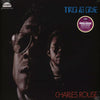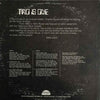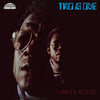





Charles Rouse - Two Is One
ORDER LIMITED TO ONE ITEM PER CUSTOMER
Charlie Rouse - Tenor Sax, Bass Clarinet (B2) [click here to see more vinyl featuring Charlie Rouse]
George Davis - Guitar (A1, A3, B2)
Paul Metzke - Guitar
Martin Rivera - Bass (A1, A3)
Stanley Clarke - Bass (A2, B1, B2)
Calo Scott - Cello
Azzedin Weston - Conga (A1, A3)
Airto Moreira - Percussion (A2, B1, B2) [click here to see more vinyl featuring Airto Moreira]
David Lee - Drums
1 LP, standard sleeve
Limited edition
Original analog Master tape : YES
Heavy Press : 180g
Record color : black
Speed : 33 RPM
Size : 12'’
Stereo
Studio
Record Press : unspecified
Label : Pure Pleasure Records
Original Label : Strata East Records
Recorded at The Warehouse, 320 W. 46th Street NYC, in 1974
Engineered & mixed by Bill Robertson & Craig “Brewster” Bishop
Produced by Cha-Rou Inc.
Remastered by Ray Staff at Air Mastering, Lyndhurst Hall, London
Tracks :
Side A:
1 Bitchin'
2 Hopscotch
3 In A Funky Way
Side B:
1 Two Is One
2 In His Presence Searching
Reviews :
« By this point, the assumption that listeners would like this record simply because they liked Charlie Rouse's work with the Thelonious Monk Quartet would be presumptuous. The music found herein is much more typical for a Strata East release than it is typical for Rouse. Modern, beat-conscious listeners on the hunt for hip-hop samples will find a number of tasty moments here. Most of them are to be found on the much funkier first side. The tune "Hopscotch," in particular, begins with one of the most sample-ready intros ever committed to disc. Also, and in seemingly direct contrast, if features a busy, complex head, making it sound more like a George Russell piece than one fit for a Strata East record. Otherwise, the album's opener, "Bitchin'," as well as "In a Funky Way," are both expectedly rocking (given the titles and all), with the latter being especially reminiscent of the Meters. Rouse and company take a sharp left turn on the second side, during which they perform the title track (in two sections) and the brooding "In His Presence Searching." "Two Is One" begins with a bassline in 9/8, drums in 6/8, and cello and tenor in 3/4. Needless to say, it sounds little like the funk-inspired tunes on side one. Only when the second section kicks in does the group lay down a groove -- albeit in 7/8. The result is funky enough to forget that it's in seven but entirely too odd for even the hippest dancefloor. Rouse's style translates well to this kind of material. His solos are as fluid as ever and even on spiritual numbers like "In His Presence Searching" -- during which he makes a rare appearance on bass clarinet -- he sounds at home. Given his discography, this record is atypical and probably not for everyone, but enjoyable nonetheless. » AllMusic Review by Brandon Burke
It seems that every major jazz artist has a one-off sort of record in their discography, be it with strings, voices, spoken word or - as in this case - a foray into the funkier side of jazz. Charlie Rouse (going here as Charles Rouse) gets his chance on Two Is One, a funky soul jazz excursion on Strata-East, the artist-run label where creativity and pushing boundaries was at the forefront. Playing mostly with a group of session musicians, Rouse put together an album that may stray a bit from his hard bop roots, but is nonetheless an enjoyable and at times inventive record.
The style of music played here - sophisticated soul jazz with some post bop and spiritual jazz thrown in for good measure - is very much a product of it's time. 1974 saw a whole slew of artists stretching the boundaries of what jazz music could be, combining elements from the past two decades into electric jazz adventures. The piano-less group that Rouse put together is a funky one, with lots of rhythmic playing behind either the searching solos of Rouse on the tenor or some inventive electric guitar work from either George Davis or Paul Metzke who appear together on all but a couple of tracks. Cal Scott gets plenty of time to shine throughout on what sounds like an electrified cello, an unusual instrument for modern jazz to be sure, but one that manages to fit in just fine here.
The first side of the album is all slow burning soul jazz, highlighted by the opening track "Bitchin'" where Rouse shows off that he is more than capable of setting down soulful lines over a funky backbeat. The second side is where the group gets a whole lot more inventive, particularly on the title track where they mix some post bop madness with the soul jazz sound. "Two Is One" features different tempos throughout: in the "first section" the bass plays in 9/8 time, the drums in 6/8 time and the cello and tenor are in 3/4 time. For the "second section" the rhythm section switches to 7/8 time while cello and tenor move to 4/4 time. Stanley Clarke is on bass here and his deep and twisty electric bass line is placed prominently up front.
"Two Is One" is certainly the highlight of the album from a pure jazz standpoint, and it lives up to it's title, which according to Gene Lewis' liner notes is taken from a Thelonious Monk phrase meaning two people so in tune with one another that they become one. The album finishes off with "In His Presence Searching," a spiritually informed jazz number that is reminiscent of the work being done during this period by the likes of Pharoah Sanders and Gary Bartz, (while not being quite as out there as their best work). The tune is all rhythmic glory, with Rouse and Scott playing introspective and penetrating solos throughout. It's a nice album closer, and a good reminder that while Two Is One may be best known for it's funkier excursions, Rouse had a few tricks up his sleeve and the album, when taken as a whole, is a complete statement from a legendary jazz musician.
Ratings :
AllMusic : 4 / 5 , Discogs : 4,54 / 5


